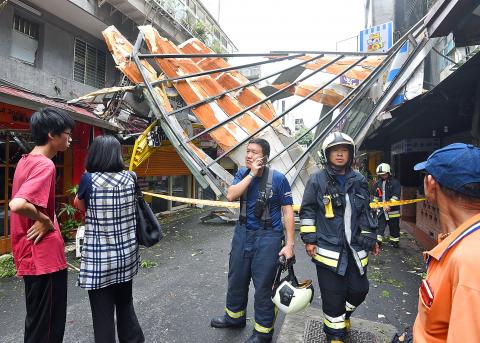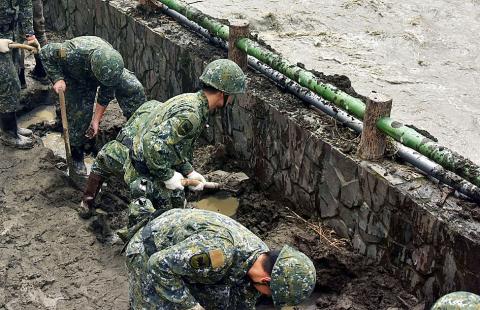More than 600 people were injured by Typhoon Megi, which made landfall on the east coast on Tuesday afternoon.
The Central Weather Bureau (CWB) lifted both land and sea warnings at 5:30pm yesterday after Megi weakened into a tropical storm and landed on China’s Fujian Province.
CWB forecaster Hsieh Ming-chang (謝明昌) said that although the nation was no longer under the storm’s coverage, wind speed in coastal areas still reached level 8 on the Beaufort scale.

Photo: Liao Chen-huei, Taipei Times
Heavy precipitation continued in some southern regions due to lingering clouds from the storm, which should ease today, he said.
He added that a low-pressure system that is about 500km southeast of Taiwan is likely to move toward the nation between tomorrow and Saturday, which could affect the weather in Hualien, Taitung and southern Taiwan, he said.
Meanwhile, Tropical Storm Chaba formed early yesterday morning, which the bureau forecast would move near Okinawa, Japan, by Monday.

Photo: CNA
Hsieh said the storm was still about 2,860km from Taiwan.
“We are monitoring the movement of Chaba and the force of the Pacific high-pressure system, which would determine when the storm would turn north and in which direction it would go,” he said.
Statistics from the Central Emergency Operation Center as of 5:30pm yesterday showed that Megi left four people dead and 622 injured in the past two days, with more than 4,000 people remaining in shelters.
A total of 2,402 households were still without water supply.
Telecom service providers said they had mobilized thousands of engineers to repair about 13,000 base stations that were damaged. A total of 5,384 base stations had not resumed normal functions.
As of 9:53pm yesterday, 359,927 households were still without power, state-run Taiwan Power Co (台電) said.
The Taiwan Railways Administration (TRA) and Taiwan High Speed Rail Corp resumed train services yesterday afternoon, although TRA canceled operations of the Alishan Forest Railway, as well as the Pingsi (平溪) and Jiji (集集) branch lines.
More than 750 flights departed from the Taiwan Taoyuan International Airport yesterday, as the nation’s largest airport activated a plan to transport about 12,000 passengers whose flights were canceled on Tuesday.
Statistics from the Civil Aeronautics Administration (CAA) showed that 234 domestic flights and 58 international flights were canceled yesterday.
One domestic and 112 international flights were also delayed.
The agency said that it was investigating whether EVA Air (長榮航空) had violated aviation rules when it dispatched flights on Tuesday. Netizens have accused the nation’s second-largest airline of forcing pilots to land under inclement weather.
The standards that the airline company set to dispatch or land a flight on a typhoon day, as well as the amount of fuel that its airplanes were carrying and the number of hours its cabin crew were working would all be under scrutiny, the CAA said.
EVA had 45 flights that were scheduled to land at the Taoyuan Airport on Tuesday. Thirty flights landed at the airport, including those returning to Taoyuan after first landing in Hong Kong or Okinawa. In addition, seven flights landed in Hong Kong, seven in Taichung and one in Macau, the agency said.
The CAA said the airline is supposed to choose at least two backup airports if its flights could not land at their target destinations.
EVA yesterday issued a statement denying the allegations, adding that it would sue individuals spreading unsubstantiated comments online.

The Taiwanese passport ranked 33rd in a global listing of passports by convenience this month, rising three places from last month’s ranking, but matching its position in January last year. The Henley Passport Index, an international ranking of passports by the number of designations its holder can travel to without a visa, showed that the Taiwan passport enables holders to travel to 139 countries and territories without a visa. Singapore’s passport was ranked the most powerful with visa-free access to 192 destinations out of 227, according to the index published on Tuesday by UK-based migration investment consultancy firm Henley and Partners. Japan’s and

NATIONAL SECURITY THREAT: An official said that Guan Guan’s comments had gone beyond the threshold of free speech, as she advocated for the destruction of the ROC China-born media influencer Guan Guan’s (關關) residency permit has been revoked for repeatedly posting pro-China content that threatens national security, the National Immigration Agency said yesterday. Guan Guan has said many controversial things in her videos posted to Douyin (抖音), including “the red flag will soon be painted all over Taiwan” and “Taiwan is an inseparable part of China,” while expressing hope for expedited “reunification.” The agency received multiple reports alleging that Guan Guan had advocated for armed reunification last year. After investigating, the agency last month issued a notice requiring her to appear and account for her actions. Guan Guan appeared as required,

Japan and the Philippines yesterday signed a defense pact that would allow the tax-free provision of ammunition, fuel, food and other necessities when their forces stage joint training to boost deterrence against China’s growing aggression in the region and to bolster their preparation for natural disasters. Japan has faced increasing political, trade and security tensions with China, which was angered by Japanese Prime Minister Sanae Takaichi’s remark that a Chinese attack on Taiwan would be a survival-threatening situation for Japan, triggering a military response. Japan and the Philippines have also had separate territorial conflicts with Beijing in the East and South China

A strong cold air mass is expected to arrive tonight, bringing a change in weather and a drop in temperature, the Central Weather Administration (CWA) said. The coldest time would be early on Thursday morning, with temperatures in some areas dipping as low as 8°C, it said. Daytime highs yesterday were 22°C to 24°C in northern and eastern Taiwan, and about 25°C to 28°C in the central and southern regions, it said. However, nighttime lows would dip to about 15°C to 16°C in central and northern Taiwan as well as the northeast, and 17°C to 19°C elsewhere, it said. Tropical Storm Nokaen, currently